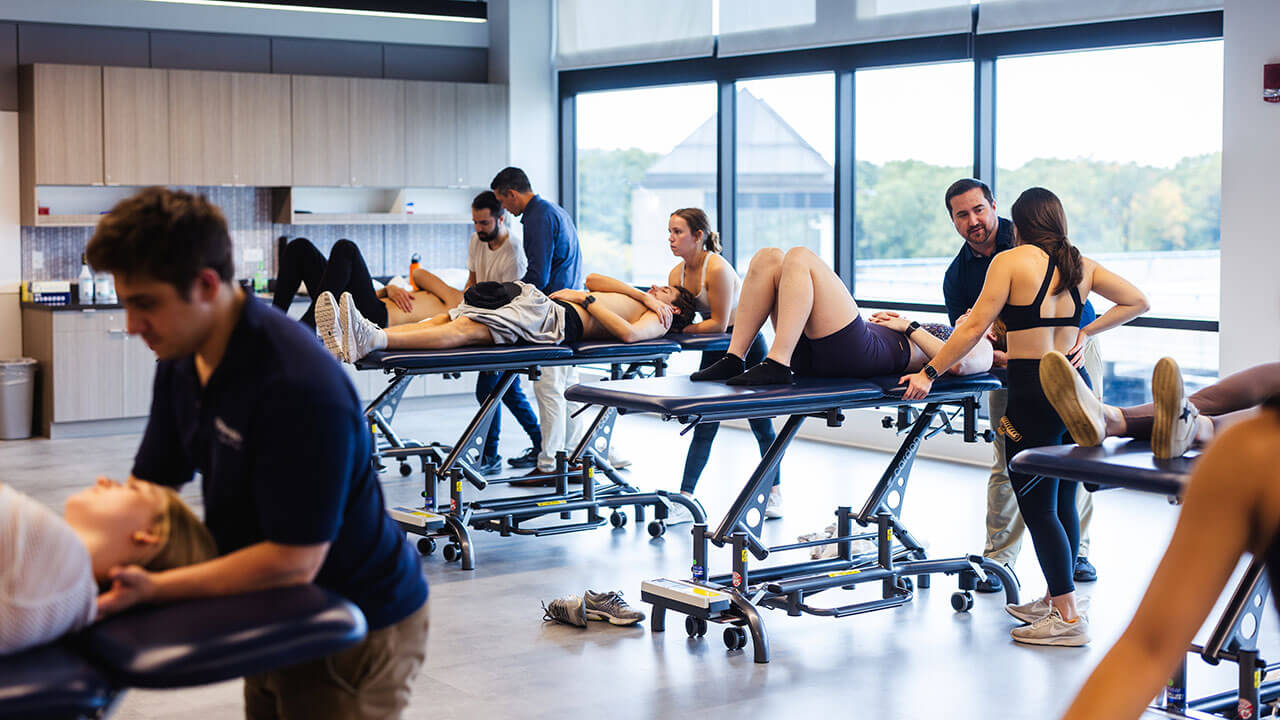
CAPTE reaccreditation recognizes excellence in physical therapy program
June 03, 2023

June 03, 2023

CAPTE undertakes rigorous program review to grant specialized accreditation status to qualified entry-level education programs for physical therapy. University program leaders were notified of CAPTE’s reaccreditation on May 24.
“This affirms that we have a very, very solid foundation, and all the things that we continue to do to improve that educational excellence will be enhanced in the future,” said Ken Kosior, chair of the physical therapy department.
The accreditation ensures the program meets or exceeds standards to produce quality professionals. While prospective students look for that “gold standard,” Quinnipiac’s program surges far beyond CAPTE’s stamp of approval, said Kosior.
“Students do look for that gold stamp of accreditation, but it also allows us to do the things that we’ve excelled at, for what will be 50 years, coming up in 2024,” said Kosior.
“Our model of direct entry early assurance, with students coming in as first-year college students and matriculating to our program; with our robust clinical partners, our vast network of alumni; and the level with which we educate students to be not only great clinicians but great people, and think autonomously and adapt in a healthcare environment that we know is changing at a feverish pace, is really what sets us apart and is going to allow us to continue to grow.”
During an 18-month period, a combination of stakeholders contributed to the CAPTE reaccreditation review process, said Tracy Wall, director of the physical therapy department.
“We gathered stakeholders from alumni, our current partners, and our current student group. CAPTE also meets with admissions, the dean, the provost and the president, as well as every single faculty member. And, because we’re an early assurance program, they meet with undergraduates, as well,” said Wall.
Kosior and School of Health Sciences senior associate dean Betsey Smith, who provided document review for reaccreditation submission, said Wall is to be commended for her months of effort and involvement to help demonstrate the many exceptional educational aspects of the program to CAPTE.
“It’s really a team effort,” said Smith. “Tracy is to be applauded for all that she did to put this together.”
In addition to showing the program has good alignment, assessment, curriculum, and produces strong students, Wall said the information supplied to CAPTE highlights the volume of work that the faculty puts into the program.
“Our hearts and souls go into this program, and it’s really a reflection of that,” said Wall.
Wall said this reaccreditation was especially meaningful as it was undertaken in the footsteps of her friend and peer, the late Katherine Harris. Harris served as chair and program director of the physical therapy department until her passing in 2020.
“She was determined that we were going to do a great job with this reaccreditation,” said Wall. “With Ken as the chair, and myself as the program director, we took this on with a promise to Kathy that we would.”
Kosior noted the university’s endowed Katherine Harris Professional Development Fund ensures her memory and work lives on with program students. Each December, the program’s White Coat ceremony for students is held in honor of Harris.
Alumna Meredith Gaucher, ’10, DPT ’13, is also a part-time faculty member. She said she valued the opportunity to provide her unique perspective during the CAPTE review.
“I’ve really been involved with Quinnipiac since I graduated, most often with EQUIP, our pro bono clinic. That was my capstone project as a student. How it’s been embraced by the program was one of the factors we highlighted with CAPTE,” said Gaucher. “The education is intentional, and it continues to grow, and get better and better.”
Over the last two to three years, the weekly EQUIP rehabilitation clinic has garnered a 70% student volunteerism rate and is one of the hallmark educational experiences helping to set Quinnipiac’s program apart, said Kosior.
The DPT program provides both in-class and in-clinic opportunities for students to engage in the essential elements of patient/client management. Working with Clinical Education Experience students, Gaucher said she hears great things from clinical partners.
“For clinical partners to say they’re always going to want to take Quinnipiac students because they know what they’re going to get; and they’re just so thrilled with them, is the icing on the cake,” said Gaucher.
Kosior said the 10-year CAPTE reaccreditation arrives at an exciting time for the future of the DPT program.
“We’ve been able to maintain a level of educational excellence that I think is valued and sought after in the profession. This gives us the breathing room, and the autonomy, to be innovative and develop the next curriculum, and the next generation of Quinnipiac physical therapists,” said Kosior.
Quinnipiac Today is your source for what's happening throughout #BobcatNation. Sign up for our weekly email newsletter to be among the first to know about news, events and members of our Bobcat family who are making a positive difference in our world.
Sign Up Now